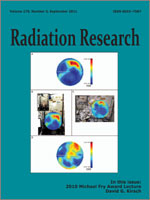The uneven shielding of the International Space Station from the vessel hull, racks and experiments produces a modulation of the internal radiation environment. A detailed knowledge of this environment, and therefore of the Station's shielding effectiveness, is mandatory for an accurate assessment of radiation risk. We present here the first 3D measurements of the Station's radiation environment, discriminating particle trajectories and LET, made possible using the detection capability of the ALTEA-space detector. We provide evidence for a strong (factor ≈ 3) anisotropy in the inner integral LET for high-LET particles (LET > 50 keV/µm) showing a minimum along the longitudinal station axis (most shielded) and a maximum normal to it. Integrating over all measured LETs, the anisotropy is strongly reduced, showing that unstopped light ions plus the fragments produced by heavier ions approximately maintain flux/LET isotropy. This suggests that, while changing the quality of radiation, the extra shielding along the station main axis is not producing a benefit in terms of total LET. These features should be taken into account (1) when measuring radiation with detectors that cannot distinguish the direction of the impinging radiation or that are unidirectional, (2) when planning radiation biology experiments on the ISS, and (3) when simulating the space radiation environment for experiments on the ground. A novel analysis technique that fully exploits the ability to retrieve the angular distribution of the radiation is also presented as well as the angular particle flux and LET characteristic of three geomagnetic zones measured during 2009 by the ALTEA-space detector. This technique is applied to the ALTEA-space detector, but a wider applicability to other detectors is suggested.
How to translate text using browser tools
11 May 2011
Heavy-Ion Anisotropy Measured by ALTEA in the International Space Station
L. Di Fino,
M. Casolino,
C. De Santis,
M. Larosa,
C. La Tessa,
L. Narici,
P. Picozza,
V. Zaconte
ACCESS THE FULL ARTICLE

Radiation Research
Vol. 176 • No. 3
September 2011
Vol. 176 • No. 3
September 2011




